| | | OFFLINE | | Post: 18.936
Post: 1.584 | Registrato il: 28/08/2005
Registrato il: 20/01/2009 | Administratore | Utente Veteran | |
|
 GENERAL AUDIENCE TODAY
GENERAL AUDIENCE TODAY
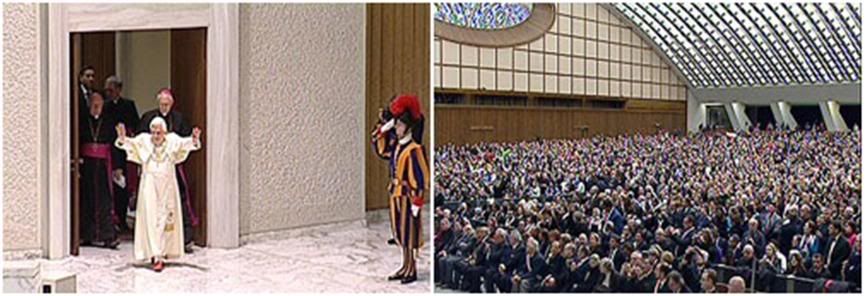
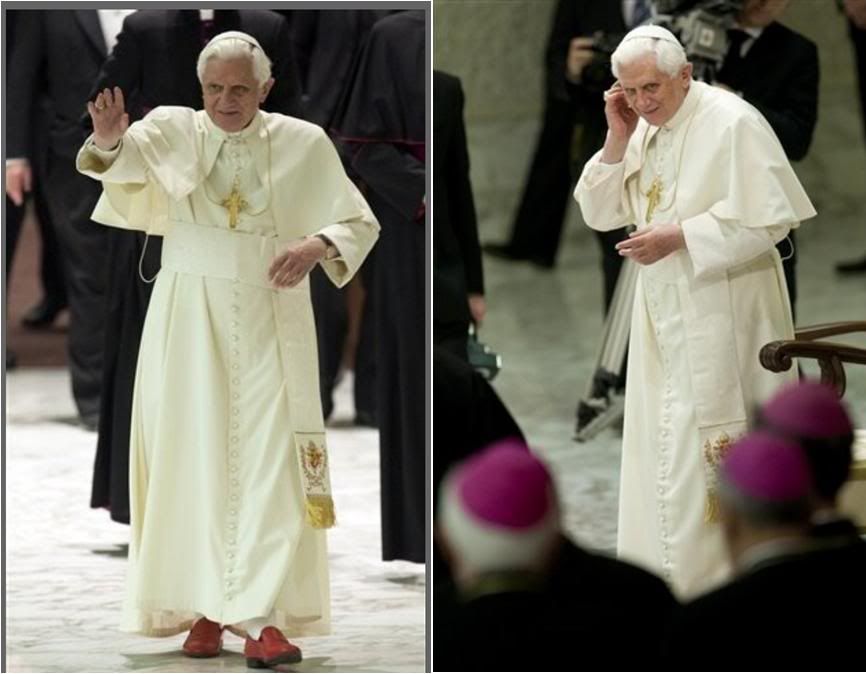
At the General Audience held today in the Aula Paolo VI, the Holy Father continued with his catecheses on great Christian thinkers of the Middle Ages, speaking about the 12th-century theologians Hugh and Richard of St. Victor.
Hers is how he synthesized the lesson in English:
In our continuing catechesis on the Christian culture of the Middle Ages, we now turn to two outstanding twelfth-century theologians associated with the monastery of Saint Victor in Paris.
Hugh of Saint Victor stressed the importance of the literal or historical sense of sacred Scripture as the basis of theology’s effort to unite faith and reason in understanding God’s saving plan.
His treatise On the Sacraments of the Christian Faith offered an influential definition of a sacrament, stressing not only its institution by Christ and its communication of grace, but also its value as an outward sign.
Richard of Saint Victor, a disciple of Hugh, stressed the allegorical sense of the Scriptures in order to present a spiritual paedagogy aimed at human maturity and contemplative wisdom.
Richard’s work On the Trinity sought to understand the mystery of the triune God by analyzing the mystery of love, which entails a giving and receiving between two persons and finds its perfection in being bestowed upon a third person.
These great Victorines, Hugh and Richard, remind us that theology is grounded in the contemplation born of faith and the pursuit of understanding, and brings with it the immense joy of experiencing the eternal love of the Blessed Trinity.
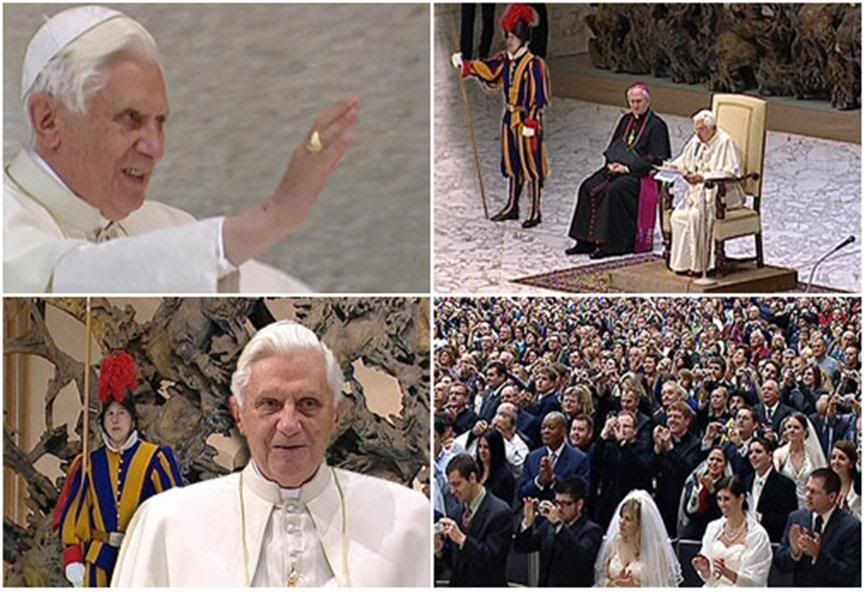
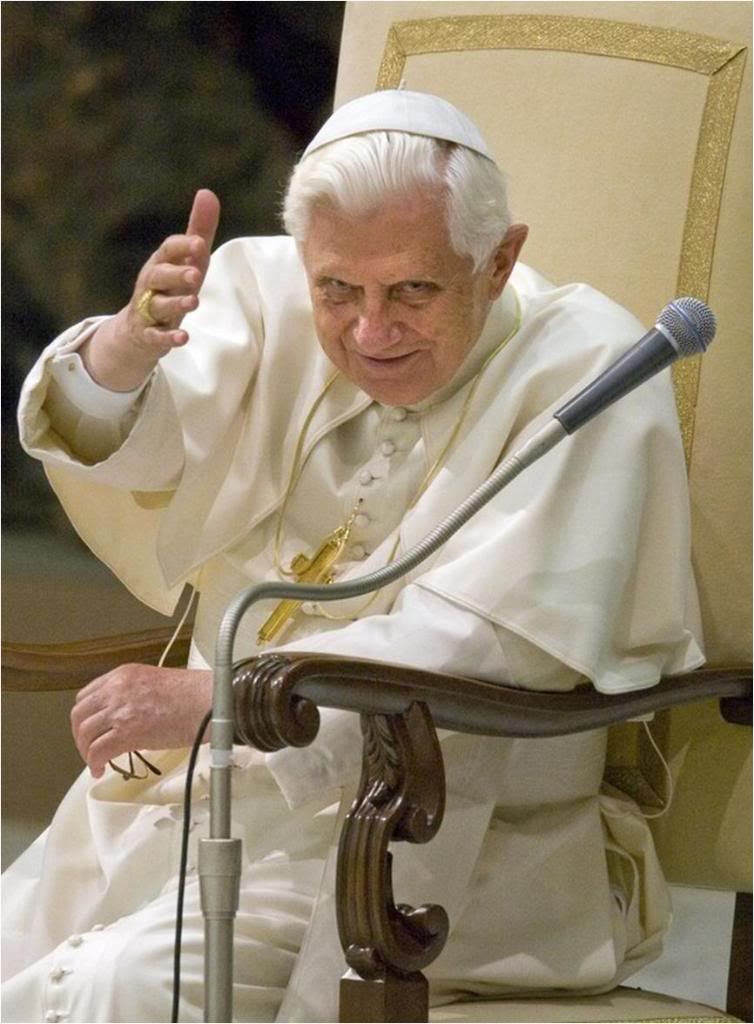 Here is a full translation of the catechesis today:
Here is a full translation of the catechesis today:
Dear brothers and sisters,
In these Wednesday audiences, I have been presenting some exemplary figures of believers who were committed to showing the concordance between reason and the faith, and to bear witness to the Gospel with their life.
Today I will speak to you of Hugh and Richard of St. Victor - two great philosophers and theologians famously known as the Victorines, because they lived and taught at the (Augustinian) abbey of St. Victor in Paris, which had been founded at the start of the 12th century by William (Guillaume) of Champeaux.
William himself was a renowned teacher, who had given his abbey a solid cultural identity. In fact, at St. Victor, a school was founded for the formation of monks which was also open to outside students, and where a happy synthesis was reached of the two ways of practising theology which I spoke about in previous catecheses: monastic theology, which was mainly oriented towards contemplating the mysteries of the faith in Scripture; and scholastic theology, which used reason to scrutinize these mysteries with innnovative methods, creating a theological system.
We have litte information about the life of Hugh of St. Victor. The date and place of his birth are uncertain: he was probably born in Saxony or in Flanders. It is known that once he came to Paris - the European center of culture at that time - he spent the rest of his life in the Abbey of St. Victor, where he was first a student then a teacher.
Before he died in 1141, he had already acquired great fame and esteem, to the point of being called a 'second St. Augustine'. Like Augustine, in fact, he meditated a great deal on the relationship between faith and reason, between the profane sciences and theology.
According to Hugh of St. Victor, all the sciences, besides being useful for understanding Scriptures, have value in themselves and must be cultivated to widen man's knowledge, and to respond to his yearning to know the truth.
This healthy intellectual curiosity led him to advise his students never to restrict their desire to learn, and in his treatise on the methodology of knowledge and pedagogy, significantly entitled Didascalion (On Teaching), he advised: "Learn gladly from everyone that which you do not know. You will be wiser than all those who want to learn something from everyone. He who gets something from everyone up becoming richer than everyone" (Eruditiones Didascalicae, 3,14: PL 176,774).
The science which occupied the Victorine philosophians and theologians in particular was theology, which requires above all the loving study of Sacreed Scripture.
To know God, in fact, one cannot but start from what God himself has revealed of himself through Scriptures. In this sense, Hugh of St. Victor was a typical representative of monastic theology, based entirely on Biblical exegesis.
To interpret Scripture, he proposed the traditiounal patristic medieval articulation, namely, the historico-literary sense first, then the allegorical or anagogic, and finally the moral.
This involved the four dimensions of Scriptural sense, which are being rediscovered today, in which one sees that a more profound sense is hidden in the text and narration offered: the thread of faith that leads us upward and guides us on this earth, teaching us how to live.
Nonetheless, while respecting these four dimensions of Scriptural sense, one must know and learn deeper the significance of the story narrated in Scriptures. Otherwise, Hugh warns, in an effective comparison, one risks being like students of grammar who ignore the alphabet.
To him who knows the meaning of the story described in the Bible, human events appear marked by Divine Providence according to a well-ordered design.
Thus, for Hugh of St. Victor, history is not the outcome of blind destiny or absurd chance, as it might appear. On the contrary, the Holy Spirit works within human history, giving rise to a wondrous dialog between men and God, their friend.
This theological vision of history brings to light the surprising and salvific intervention of God, who truly enters and acts in history - almost part of our history - but always safeguarding and respcting man's freedom and responsibility.
For Hugh, the study of Sacred Scripture and its historico-literary meaning makes true theology possible - the systematic illustration of truths, knowing their structure, illustrating the dogmas of the faith whgich he presented in solid synthesis in the treatise De Sacramentis christianae fidei (Sacraments of the Christian Faith).
In this, one finds, among other things, a definition of 'sacrament' which, perfected by later theologians, contains salient points that are still very interesting today.
"The sacrament", he wrote, "is a corporeal or material element proposed in an external and sensible manner, which represents in its image an invisible spiritual grace - which it represents because it was instituted for that purpose, and contains it (grace) because it is capable of sanctifying" (9,2: PL 176,317).
On the one hand, the visibility of the symbol, the 'corporeality' of the gift of God, in which nonetheless, is hidden the divine grace that comes from one source: Jesus Christ himself who created these fundamental symbols.
Therefore, there are three elements that come together to define a sacrament, according to Hugh of St. Victor: its institution by Christ, the communication of grace, and the analogy between the visible element - the material - and the invisible, which are the divine gifts.
It is a vision very close to contemporary sensibility, because the sacraments are presented with a language woven from symbols and images
that can speak immediately to the heart of man.
It is important even today that liturgical animators, particularly priests, should be able to appreciate with pastoral wisdom the very signs of the sacramental rites - the visibility and tangibleness of Grace - by attentive care in catechesis, so that every sacramental celebration is experienced by all the faithful with devotion, intensity and spiritual joy.
A worthy disciple of Hugh of St. Victor, was Richard, who came from Scotland. He was prior of the Abbey of St. Victor from 1162-1173 when he died. Of course, Richard too gave a fundamental role to the study of the Bible, but unlike his teacher, he favored the allegorical sense, the symbolic meaning of Scripture, through which, for instance, he interpreted the Old Testament figure of Benjamin, son of Jacob, as a symbol of contemplation and the peak of spiritual life.
Richard treats this subject in two texts, Benjamin Minor and Benjamin Major, in which he proposes to the faithful a spiritual path that calls above all for the exercise of various virtues, learning with reason to discipline and put order into one's sentiments and one's interior motives, both affective and emotive.
Only when man achieves equilibrium and human maturation in this sense will he be ready to proceed to contemplation, which Richard defines as "a profound and pure spiritual look at the wonders of wisdom, associated with an ecstatic sense of awe and admiration" (Benjamin Maior 1,4: PL 196,67).
Thus contemplation is a point of arrival, the result of an arduous path, which involves dialog between faith and reason, and therefore, once more, theological discourse.
Theology starts from the truths which are the object of the faith, but it seeks a more profound knowledge of such truths with the use of reason availing of the gift of faith.
This application of reason to the understanding of the faith is presented convincingly in Richard's masterpiece, one of the great books of history, De Trinitate (Of the Trinity). In the six books that make it up, he reflects acutely on the Mystery of the one and triune God.
According to him, since God is Love, the single divine substance consists of communication, oblation and 'dilezione' ['spiritual love' is the closest English equivalent] between two persons, the Father and the Son, who are in an eternal exchange of love.
But the perfection of happiness and goodness does not allow exclusivism and closure: it requires the eternal presence of a third Person, the Holy Spirit. Trinitarian love is participative, a concordance that consists of a superabundance of delight, an experience of incessant joy.
Richard thus assumes that God is love, he analyzes the essence of love, what the reality of love involves, thus arriving at the Trinity of Persons, which is the logical expression of the fact that God is Love.
Nonetheless, he is aware that love, although it reveals to us the essence of God, that it makes us 'understand' the mystery of the Trinity, is still just an analogy to speak of a Mystery that surpasses the human mind, and, being a mystic poet as well, he makes use of other images.
For instance, he likens divinity to a river, to a wave of love that gushes from the Father, then flows and reflows in the Son, to be joyously diffused by the Holy Spirit.
Dear friends, authors like Hugh and Richard of St. Victor lift up our spirits to the contemplation of divine realities. At the same time, the immense joy we derive from thinking about, admiring and praising the Most Holy Trinity, establishes and sustains our concrete commitment to be inspired by such a perfect model of communion in love, in order to construct our everyday human relationships.
The Trinity is truly the perfect communion! How the world would change if, in families, in parishes and in every community, relationships were lived always following the example of the three divine Persons, in which each one lives not only with the other, but for the other and in the other!
Some months ago, I said at the Angelus: "Only love makes us happy, because we live in relationships - we live to love and be loved" (June 7, 2009).
It is love which accomplishes this unending miracle: as in the life of the Most Holy Trinity, plurality is recomposed in unity, where everything is complaisance and joy.
With St. Augustine, who was held in high honor by the Victorines, we too can exclaim: "Vides Trinitatem, si caritatem vides" - You contemplate the Trinity if you see love" (De Trinitate VIII, 8,12).
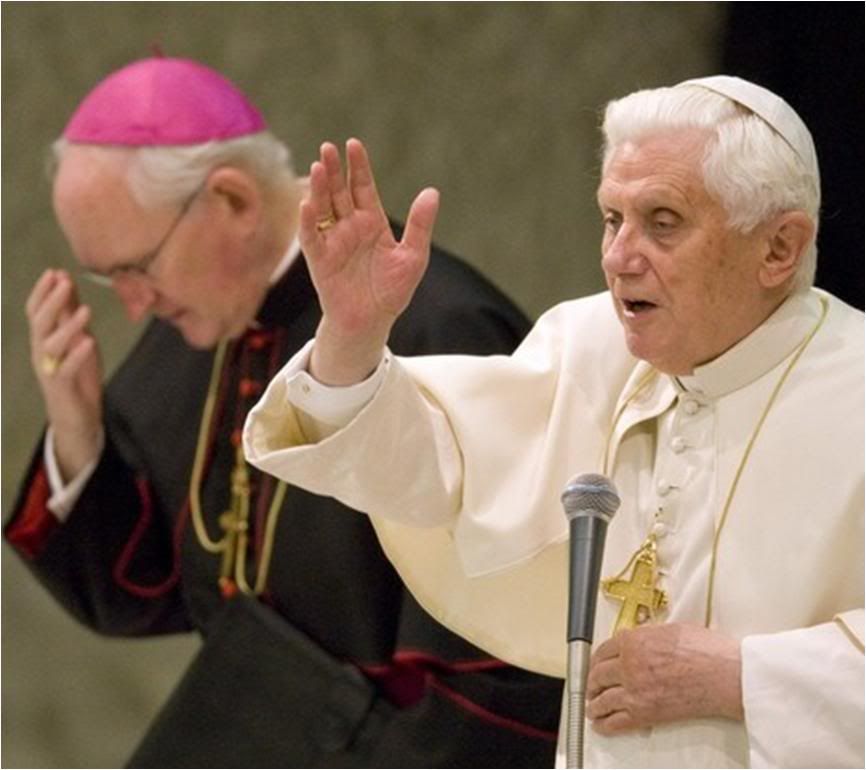
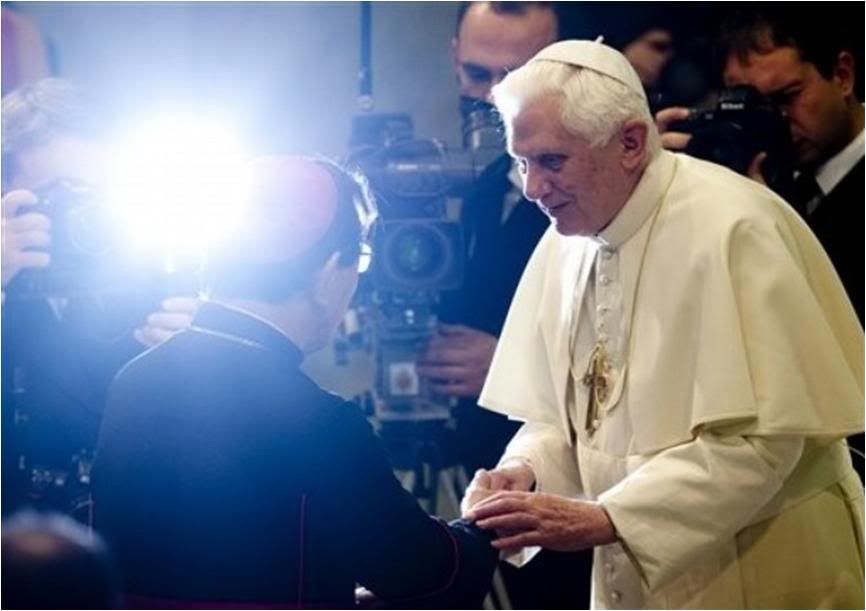 [Modificato da TERESA BENEDETTA 25/11/2009 17:06] |